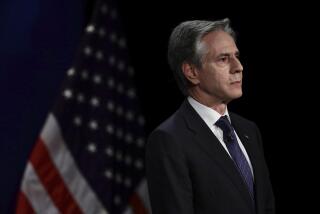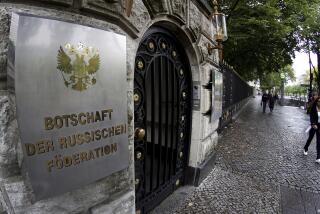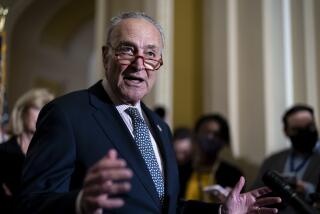Panel Votes to Keep Soviets’ New Embassy Closed
WASHINGTON — The Senate Foreign Relations Committee approved a bill Friday that would bar the Soviet Union from occupying its new Washington embassy or using the facility’s electronic communication and surveillance equipment until Secretary of State George P. Shultz certifies completion of a “secure and suitable” U.S. Embassy in Moscow.
The provision was contained in a $2.12-billion authorization bill for State Department spending for fiscal 1988, which begins Oct. 1. The measure was approved by a 17-1 vote in an unusual display of bipartisan support, with only Sen. Jesse Helms (R-N.C.) opposed. Helms said he intends to offer amendments to the measure on the Senate floor.
These will include, Helms’ aides said, a set of restrictions designed to shoot down one of Shultz’s pet projects, an official residence for the secretary of state.
Although the committee narrowly approved that project--on condition that it be financed by private donations--Helms plans to introduce amendments limiting individual contributions to $1,000, the size of the house to 3,500 square feet and its location to a Washington neighborhood accurately reflecting the racial mix of the city’s 70% black population.
The Soviet embassy controversy has provoked severe congressional criticism of the State Department for its handling of a matter that began in 1972, when each nation sought to expand and modernize its diplomatic missions.
The Soviet Embassy has proceeded to near-completion on one of the highest hills in Washington, a point permitting easy electronic monitoring of the capital’s communications, but the U.S. Embassy--situated in what has been called a Moscow swamp--has suffered construction delays and cost overruns.
Congressional wrath exploded when it was disclosed that the $23-million chancery building, the first phase of the $190-million embassy complex, was structurally unsound and riddled with bugs planted by Soviet workmen.
The Senate Intelligence Committee recommended in an April 30 report that the Moscow chancery be razed and rebuilt and urged a ban on use of the Soviet building here.
In a vote on another area of U.S.-Soviet relations, the committee unanimously supported an increase in funding for the arms control talks in Geneva. On the motion of Chairman Claiborne Pell (D-R.I.), the panel approved a $29-million authorization for the Arms Control and Disarmament Agency that included $7,063,000 for the arms negotiations, the full amount requested by the Administration.
“It’s a pretty good bill,” Pell said of the entire measure.
More to Read
Sign up for Essential California
The most important California stories and recommendations in your inbox every morning.
You may occasionally receive promotional content from the Los Angeles Times.









